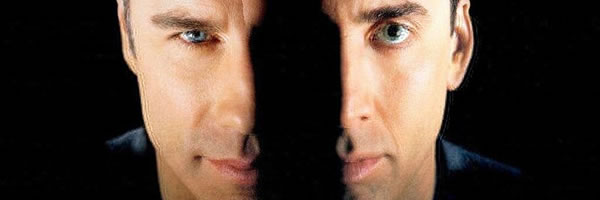Have you ever watched MTV’s Catfish? Basically, the synopsis of every episode is some poor fool ends up finding out the person they have had an internet relationship with for a long time is not who they say they are. In an episode my wife and I recently watched, some dude fell in love with a beautiful woman online without ever having met her. The Catfish Crew ended up finding this purported vixen, hoping to unite the two star-crossed lovers. Turns out, she was, in fact, ratchet. (Am I using that right, kids?)
I have some questions for you, dear reader:
If you fell in love with somebody, but they ended up looking very different from what you’d thought, would you stay in love? If everything else about the person was the same, i.e., personality, voice, occupation, life story, would looks matter? Even if you could get past this, it’d be a pretty big breach of trust for somebody you fell in love with to lie like that, right?
Let’s set the obvious trust issues aside for a moment.
Humor me, and consider the following unrealistic, hypothetical. Think of the person you love most. Husband, wife, girlfriend, boyfriend, whatever… If that person went through a dramatic surgery, “Face Off” style, and completely altered their appearance, while retaining every thing else that makes them the person you love, would your feelings for the person change or remain the same?
By the way, spare me the “That’s superficial!” hyperbole. I’m not talking about the same person maybe gaining a little weight or going bald after previously having a full head of hair… I mean, a dramatic change in their appearance! What if they didn’t remotely resemble their former appearance? What if they stayed within the same range of “attractiveness” but looked completely and utterly different?
My theory is that in most cases, a dramatic change in looks would be a game changer for a relationship even if the person was similarly attractive but looked completely different (Nicolas Cage to John Travolta). I think physical appearance and facial features are closely tied with identity. We bond to that image. When we fall in love or attach to a person, we obviously fall in love with all the wonderful things that make up a person’s personality. It just seems all of that love for a person’s personality and characteristics are encompassed within the “snap shot” image we have of that person in our own heads.



When I imagine my partner suddenly having a different face, most of my discomfort comes from the weird real life prospect of having someone say “hey, I’m your boyfriend, really! I just got a new face”. Like hell you are, who would believe that?
The closest thing I can think of to your hypothetical is someone requiring a face transplant (maybe in a few years when the procedure is such that people come out looking really nice). If my partner needed a face transplant, of course that wouldn’t affect how I feel about him. We’d cope with the changes and move on. (If he did it for cosmetic reasons, he would be doing something completely out of character, and THAT would be the problem, not the actual face change.)
Great response, Lauren. For you, the context under which the change took place would be the determining factor. Do you think it’d be a challenge to love the “new” boyfriend at all?
So I think what it comes down to is whether the nature of love is constant. “Love is constant” means “X’s emotion toward Y must endure for an indefinite (unspecified) length of time for it to be love.” If not, then there are reasons why the love ended. So what it comes down to is whether the reasons to end the relationship are, in fact, good reasons. Let’s give two different type of reasons: R1 and R2 reasons for the end of love.
Let’s call R1 reasons love ending any reason that negates the emotion’s having been love. For example, a person “loved” another for their beautiful face, and it ends as the face inevitably ages.
Let’s call R2 reasons love ending (for not being constant) any reason that does not put in doubt the emotion having been love. For example, X loved Y until Y ran off to Paris with Z.
With the face change, it seems that initially, it’s an R1 reason, right? Or is it? Is the face change just a dramatic choice that your partner did, like in face/off? Or is it more like something out of one’s control, like a horrific accident or something?
Either way, I still take it that it was an R1 reason. So then the question: are R1 reasons good enough to end the love? I lean towards “no,” but I’d like to know more about what you’re thinking.
Yeah, it would fall under R1, but not due to the example for R1 you provided. I’m saying people become attached to a person and their identity through what they look like. We do this for ourselves, as well. My friend made a point through all of this by saying that if you woke up in the morning with a completely different face, you wouldn’t feel “like yourself.” You would still be yourself, obviously, but the shock of not looking anything like what you have grown accustomed to yourself looking like would lead to a feeling of detachment. Possibly detachment from one’s own self/identity. Same thing if we have a partner that, for whatever reason, looks completely different. Our attachment to them would be severed due to the marked change in their appearance. One could learn to “re-love” that person, but I think the shocking visual change would lead us to feel as though we were in love with a stranger even though everything else about the person was there.
Ok. So let me back up a bit and see why we fall in love in the first place. Do we love the person because we find that person valuable, or do we find the person valuable because we love that person? If you say the former, then you would say that love is appraising value on the beloved. You are already recognizing value in the beloved, and that is the reason why you love that person. You love the person because of the value you see in that person. You’re saying that x loves y because x finds the features of y valuable or attractive.
If you say the latter, then you would say you are bestowing value on the beloved. By loving that person, you don’t recognize the value that is in the person. Rather, you are seeing the person valuable because you love that person. You’re saying that x finds the properties of y to be valuable because x loves y.
So now what happens if the person’s face changes. Well, let’s go back to “love is constant” feature, but let’s amend this since you’re bringing up identity.
Let’s say that Identity Constancy is something like this. “Love is constant” means “if X loves Y at a given time, then X’s love for Y will continue after that time as long as X is alive and Y remains the same person.”
Now what does that imply? It seems that if X’s emotion toward Y ends while Y is still Y, X’s emotion is not and could not have been love. In that case, R1 must have ended the love.
On the other hand, if X’s emotion toward Y ends because Y has become a different person (call this new person “Z”), then X’s emotion might have been love. It ends only because its Y has disappeared. In that case R2 ended love.
But here’s where it gets interesting, if X were to love this new Z person, then according to identity constancy, X may not have loved Y. X now loves Z and does so by bestowing value.
So I think it not only comes down to whether love is constant, but also whether love is appraisal or love is bestowal.